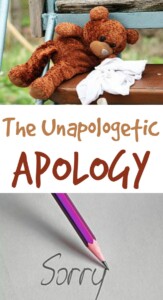The Unapologetic Apology

Not an apology
Using the word “But,” in an apology makes it null and void. When we use the word BUT, we’re not really apologizing.
Giving a true apology doesn’t come naturally. Politicians are not the only ones who are good at avoiding issues and deflecting blame on others. This practice is old – 6,000-plus years old. Even when Adam and Eve were confronted with their wrongdoing and they acknowledged that they had disobeyed God’s instruction, they shifted the blame to someone else.
That’s what we do when we apologize without apologizing. We say the words necessary to apologize, but we deflect those words onto the person to whom we apologize, thereby not taking the blame for our failure. Did you get that?

We say things like, “I shouldn’t have spoken to you like that, but I still think what you did was wrong.”
Or, we might comment, “I shouldn’t have gotten mad at you, but when you act like that, I can’t help getting mad, especially when I’m tired.”
We acknowledge, “I wish I hadn’t gotten so upset and yelled at you,” then we deplete the apology by saying, “but you shouldn’t be acting like that.”
Each of these quotes begins with an apology of sorts – and ends with an accusation.

a conclusion of “but” makes it void
When we conclude our apology with a “but”, we are accusing instead of apologizing. Tell me it ain’t so!
It’s true that sometimes people do things that punch our buttons. Yet there is no excuse for responding with poor behavior. Anger and frustration are normal emotional reactions to offensive words or actions. But they do not give us license to retaliate in like fashion. Likewise, it is natural to deflect the blame for our actions to someone else. We do this rather than accepting responsibility for our wrongs, even when another’s fault may be greater than our own. Oh, how well I know.
The one right way to give an apology
There’s a right way and there is a wrong way to give an apology. Actually, there isn’t a wrong way to give an apology, for giving it the wrong way isn’t even an apology.

There is only one way to say “I’m sorry.” That’s to say it without making any excuses. When we apologize, we need only apologize for what we did wrong. There should be no focus or deflection on the other party.
Saying “I was wrong” is embarrassing – because no one wants to be wrong. Admitting to a wrong is admitting failure, and who wants to be a failure?
Admitting we’ve messed up isn’t easy, especially depending on the other party. We want others to feel good about us, to respect us, and to admire us. Admitting we’ve been wrong – it seems to us – will diminish our successes in the eyes of others.
Yet, we fail to recognize that apologizing while deflecting blame actually challenges the respect the other party has for us. As hard as it is to not immediately retort, it’s a good idea to consider what we say before we say the words. A genuine apology will have a greater chance of being received.
Really, when we say the words of an apology and then use the word ‘but’, we are not apologizing at all. There’s no other way to truly apologize than to keep that but word out of our apology vocabulary.

To learn more about true apologies, and to learn from the example of the prodigal son in giving an apology, you can read this article. It’s called, “Saying I’m Sorry – No Ifs, ands or Buts.” To read this article, click here.

This is a repost from 8 years ago.





